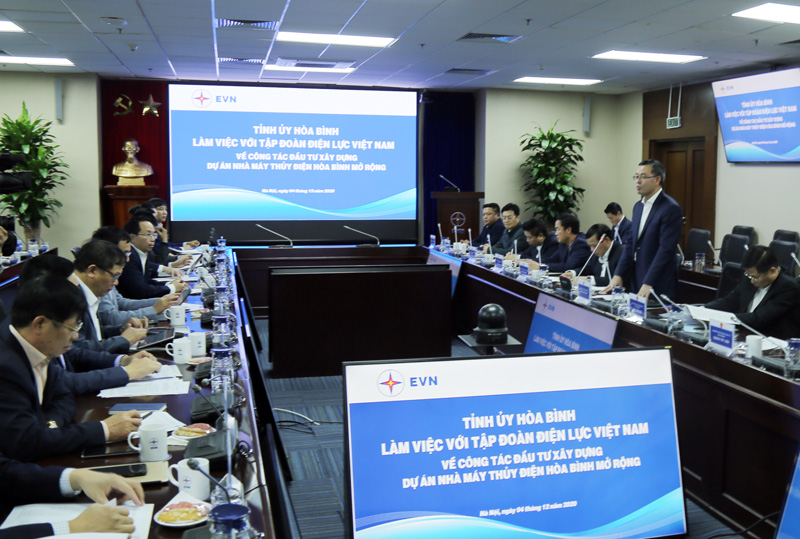
(HBO) – A delegation of Hoa Binh province led by Secretary of the provincial Party Committee Ngo Van Tuan had a working session with leaders of Vietnam Electricity (EVN) group on December 4 to discuss investment in the expansion of the Hoa Binh hydropower plant.

Secretary of the provincial Party Committee Ngo Van
Tuan speaks at the working session with EVN leaders.
The expansion project of the Hoa Binh hydropower
plant, invested with 9.22 trillion VND (397.6 million USD) by EVN, will install
two turbines with a combined capacity of 480 MW. After the expansion is
completed, the plant will have a total capacity of 2,400 MW, equivalent to that
of the Son La hydropower plant.
The project will help fully optimise water
released in the flood season, stabilise the frequency of the national power
grid, ease pressure on the existing turbines, extend the lifespan of equipment,
and cut maintenance costs.
So far, all preparations for the construction to
begin in January 2021 have been completed. The first turbine in this expansion
project is set to become operational in June 2024 and the second in October of the
same year. The whole project is scheduled to be handed over in December 2024.
Addressing the session, Secretary of the provincial
Party Committee Ngo Van Tuan said thanks to the coordination between the
province and EVN, difficulties related to site clearance have been tackled.
He asked authorities of Hoa Binh city and
relevant departments and sectors to work closely with EVN units to accelerate
site clearance and meet construction requirements.
The official also called on EVN leaders to
assist his province to invest in grid facilities to improve the quality of
electricity supply, thereby helping to meet local economic and daily demand.
For his part, Chairman of the EVN Members’
Council Duong Quang Thanh said the two sides have coordinated relatively well
in the implementation of investment projects.
EVN will provide maximum support for the
province to improve power supply in rural areas and the hydropower reservoir’s
neighbourhood, as well as socio-economic development, he said.
Thanh asked the group’s units to cooperate
closely with departments, sectors, and localities of Hoa Binh to speed up the
plant expansion and other projects on building and improving local grid
infrastructure and power supply.
He also assigned the Northern Power Corporation to work with
the province to make grid investment plans for the three communes bordering the
Hoa Binh hydropower reservoir./.
Hoa Binh province is undergoing a dynamic transformation amid Vietnam’s national digital transition. Building on Poliburo’s Resolution No. 57-NQ/TW on breakthroughs in science, technology, innovation, and national digital transformation, the province has rolled out a wide range of practical action plans. A standout initiative is the "Digital Literacy for All” movement, an effort to ensure that no one is left behind in the digital era.
Hoa Binh province is undergoing a dynamic transformation in the wake of the national digital transformation movement. Building on Resolution No. 57-NQ/TW of the Politburo on breakthroughs in science, technology, innovation, and national digital transformation, the province has implemented a wide range of practical action plans. A standout initiative is the "Digital Literacy for All” movement ambitious effort to ensure that no one is left behind in the digital age.
With a spirit of unity and proactive problem-solving, the Party Committee, the government and the people of Dong Lai Commune (Tan Lac District) have made great strides in implementing the resolutions of the 24th Party Congress of the commune for the 2020 - 2025 term. Focusing on leadership and practical actions, the commune has brought the Party’s resolutions into daily life, creating strong impacts and pushing the local development forward.
Amid the nationwide push for digital transformation, young people in Hoa Binh Province are stepping up as dynamic pioneers, applying technology to enhance Youth Union operations and expand the reach of youth-led initiatives. Through creativity and adaptability, Youth Union organizations at all levels have introduced a series of practical solutions, contributing to modern governance and community development.
In recent years, An Nghia commune, located in Lac Son district, has stepped up administrative reform, focusing on improving the quality and efficiency of its single-window service unit for receiving and processing administrative procedures. These improvements have helped create favourable conditions for local residents and organisations to handle administrative procedures, contributing to the commune’s broader socio-economic development.
The Prime Minister-approved master plan to develop the multi-use value of forests ecosystems through 2030, with a vision to 2050, aims to improve the management and sustainable use of forest resources, create jobs, increase incomes, and improve the living standards of ethnic minorities, people in mountainous and remote areas, forest workers and those living near forests.



